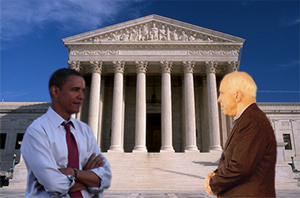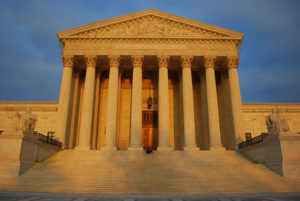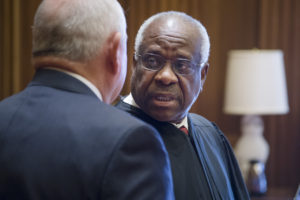Keeping the Supreme Court in Check
Neither McCain nor Obama would alter the prevailing jurisprudence in the Supreme Court or in subordinate tribunals. The unfortunate result will be a judiciary that is deferential to presidential powers and law enforcement in the name of fighting international terrorism.
A ballot for John McCain or Barack Obama is also a vote to influence the ideological complexion of the judicial branch. The Constitution empowers the president to appoint federal judges enjoying lifetime tenure, including United States Supreme Court justices, with the advice and consent of the Senate.
The weight of the evidence suggests that McCain and Obama both would appoint centrist, non-ideological judges. The reasons: Strongly ideological nominees — like Judge Robert H. Bork — would probably be blocked by Senate filibusters; and neither candidate displays strong convictions about judicial philosophy that would make him trade away items on his domestic or foreign policy agenda to secure a judicial confirmation. They both are similar to former President Bill Clinton on that score. His appointments of Associate Justices Ruth Bader Ginsburg and Stephen G. Breyer were emblematic of his disinterest in judicial philosophy and his desire to avoid confirmation headwinds.
Neither McCain nor Obama would alter the prevailing jurisprudence in the Supreme Court or in subordinate tribunals. The unfortunate result will be a judiciary that is deferential to presidential powers and law enforcement in the name of fighting international terrorism. Congress has eagerly acquiesced in its reduction to an ink blot in the Constitution’s checks and balances, and will not check or deter presidential excesses. Accordingly, the need for a robust third branch to thwart the presidency’s quest for despotic powers commensurate with an American empire is urgent.
James Madison, father of the Constitution, anticipated a judiciary taking up arms against a naturally power hungry president in introducing the Bill of Rights in the House of Representatives: “Independent tribunals of justice will consider themselves in a peculiar manner guardians of those rights; they will be an impenetrable bulwark against every assumption of power by the legislature or executive; they will be naturally led to resist every encroachment upon rights expressly stipulated in the Constitution by the declaration of rights.”
Neither McCain nor Obama will appoint judges who would fulfill Madison’s hope and expectation. In a post-9/11 atmosphere of fright and alarm, their appointees are likely to write second editions of the Supreme Court’s World War II disasters which upheld the constitutionality of racist concentration camps for 120,000 Japanese-Americans in the Hirabayashi and Korematsu decisions based on national security mendacity.
McCain in the White House would confront a Democrat-controlled Senate. In the Nov. 4 elections, the Democratic majority might reach a filibuster-proof 60. On the campaign trail to excite a conservative base, McCain has vowed to populate the Supreme Court (if vacancies arise) with carbon copies of Associate Justice Antonin Scalia and Chief Justice John Roberts. But a Democrat-controlled Senate shipwrecked President Ronald Reagan’s nomination of Bork to the Supreme Court in 1987, and there is little reason to think a less popular President McCain could succeed in appointing a Bork disciple over even more formidable Democratic opposition. McCain would forgo certain defeat, and instead choose a centrist nominee à la Justice Anthony Kennedy.
Even if McCain enjoyed a friendly Senate, he would probably dishonor his campaign rhetoric. He joined the “Gang of Fourteen” in the Senate in support of filibustering President George W. Bush’s Bork-like judicial nominees to federal appeals courts, like Miguel Estrada. As a senator, McCain has displayed yawning indifference to judicial philosophy. He effuses over erstwhile Justice Sandra Day O’Connor, who blessed the McCain-Feingold campaign finance reform law and embraced the Roe v. Wade abortion decree. But he also boasts of voting for Chief Justice Roberts, who has held McCain-Feingold unconstitutional and has scaled back Roe v. Wade in cases of partial birth abortions. Within the same speech, McCain has simultaneously praised judges who defer to the legislature and judges who refuse to defer to the legislature on matters of gun control or the taking of private property. In the matter of judges and judicial philosophy, McCain has been all things to all people. There is no reason to think he would expend serious political capital to appoint conservative judges in the face of a strongly Democratic and liberal Senate.
Like President Clinton in 1993-1994, a President Obama would encounter a sympathetic Senate upon inauguration. Clinton appointed moderates Ginsburg and Breyer to the Supreme Court in the opening years of his presidency in lieu of seeking a liberal counterpart to the conservative Scalia-Thomas axis. He chose to conserve his energies and political clout for a domestic policy agenda. Obama would probably be a reflection of Clinton in appointing moderates who are unthreatening to prevailing constitutional law or philosophy.
In his run for the White House, Obama has professed admiration for Chief Justice Earl Warren, the bête noire of judicial conservatives and notorious for inventing rather than interpreting the law. But in the midst of primary season, Obama disowned Warren in denouncing a Supreme Court decision prohibiting the death penalty for the rape of children and praising a ruling invalidating strict gun controls authored by conservative Justice Scalia.
As with McCain, federal judicial appointments have been at the margins of Obama’s senatorial career. He parted company with McCain in reluctantly voting against Chief Justice Roberts and Associate Justice Samuel Alito (although he opposed a filibuster of the latter’s confirmation). As a presidential candidate, however, he saluted their views on the death penalty and gun control while tacitly repudiating the belief, stated in opposing Roberts and Alito, that a judge should be guided as much by the heart as by the head. Judicial appointments have predictably been orphaned in Obama’s presidential campaign.
In sum, other than insincere or misleading political bombast, the difference between McCain and Obama on whom they would appoint to the federal courts is a matter of inches, not of miles.
Bruce Fein is a constitutional lawyer at Bruce Fein & Associates, chairman of the American Freedom Agenda and author of “Constitutional Peril: “The Life and Death Struggle for Our Constitution and Democracy.”
Your support matters…Independent journalism is under threat and overshadowed by heavily funded mainstream media.
You can help level the playing field. Become a member.
Your tax-deductible contribution keeps us digging beneath the headlines to give you thought-provoking, investigative reporting and analysis that unearths what's really happening- without compromise.
Give today to support our courageous, independent journalists.





You need to be a supporter to comment.
There are currently no responses to this article.
Be the first to respond.